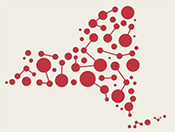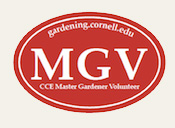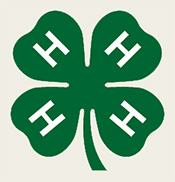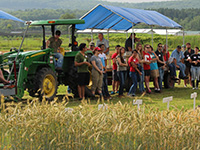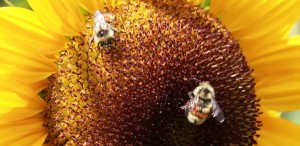
Create a Pollinator Paradise (CCE Putnam County)
The Pollinator Network @ Cornell
New York State Pollinator Protection Plan
Pollinator Partnership planting guides, learning center and children & youth activities
USDA – How Gardeners Can Help Pollinators
Garden Insects
Most insects we encounter on a daily basis are not pests. They are harmless or beneficial.
A pest is generally defined as any organism that causes annoyance or injury to human beings or human possessions or interests. The injury may be physical (bites and stings), medical (causing illness or disease), or economic (monetary loss to goods or property). “Out of the 800,000 – 1,000,000 species of insects that have been described so far, not more than 1,000 (about 1/10 of 1%) can be regarded as serious pests, and less than 10,000 (about 1%) are even occasional or sporadic pests. “ – Source: NCSU Extension
We want insects in the garden! Diverse, healthy habitats promote beneficial insects that minimize pest insects.
The best pest management approach starts with cultural practices (i.e. managing the growing environment through gardening practices including crop rotations, time of planting and harvesting). Non-chemical solutions are more likely to resolve the problem, not just the symptom. View the presence of pest insects or diseases as a symptom of a larger deficiency in your garden such as the need for a habitat for predator insects. A quick fix from the garden center shelf will not do. Look within the larger system for a more long-term solution.
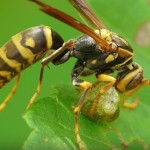
Arthropod Predators: Nature’s Defenders (10 minute video)
Getting to know insect pests to helps you make better management decisions.
Unfortunately, fear of insects and arthropods as nuisances and dangers is widespread. Engaging in routine observations of insects in our lawns, gardens and landscapes using insect sweeps and scouting will help us better understand the important, positive role of insects in a healthy ecosystem. There are thousands of possible insects to identify. Start by familiarizing yourself with both common beneficial and pest species as well as learning insect features that are important for identification.
Basic Entomology for Identification (pdf)
Beneficial Insects – Nature’s Pest Control (pdf)
Parasitoids (pdf – a large poster)
Insect Diagnostic Lab Factsheets
Take a picture or collect insects in your lawn, garden or landscape. Examine your live specimens and try to match what you observe with images and descriptions found in written or web resources.
bugguide.net
Common Spiders of New York (pdf)

